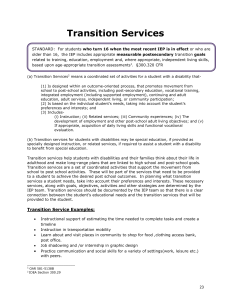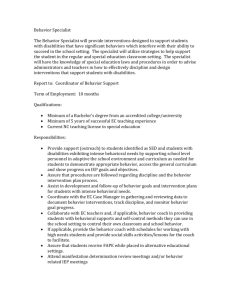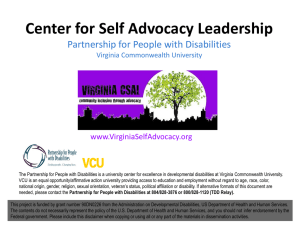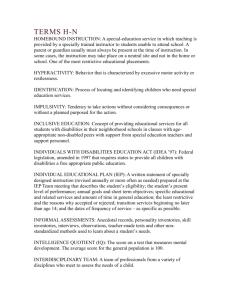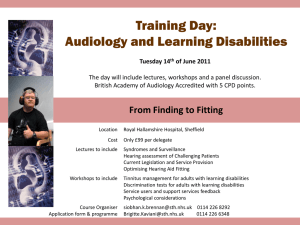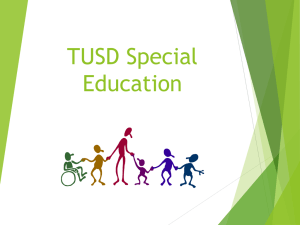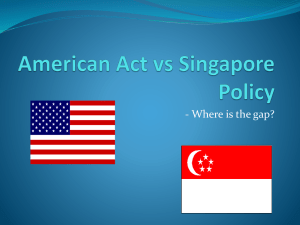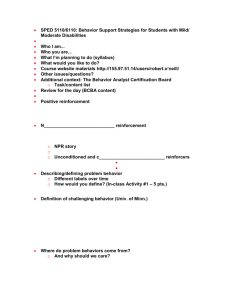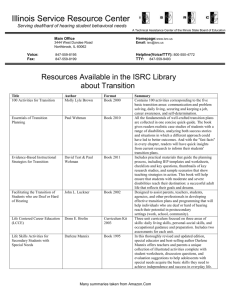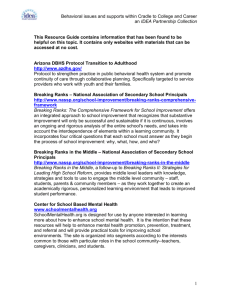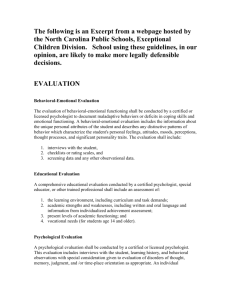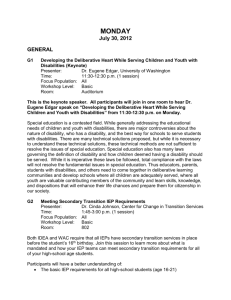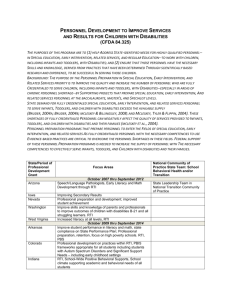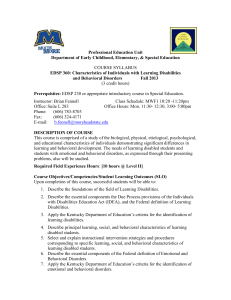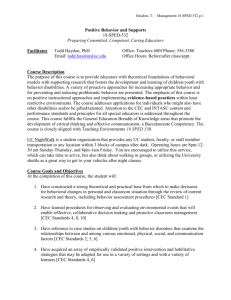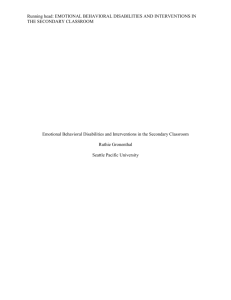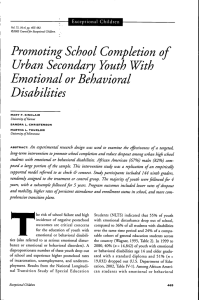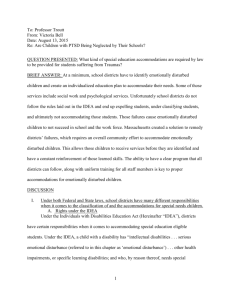Continuum of Services - Pickens County Schools
advertisement
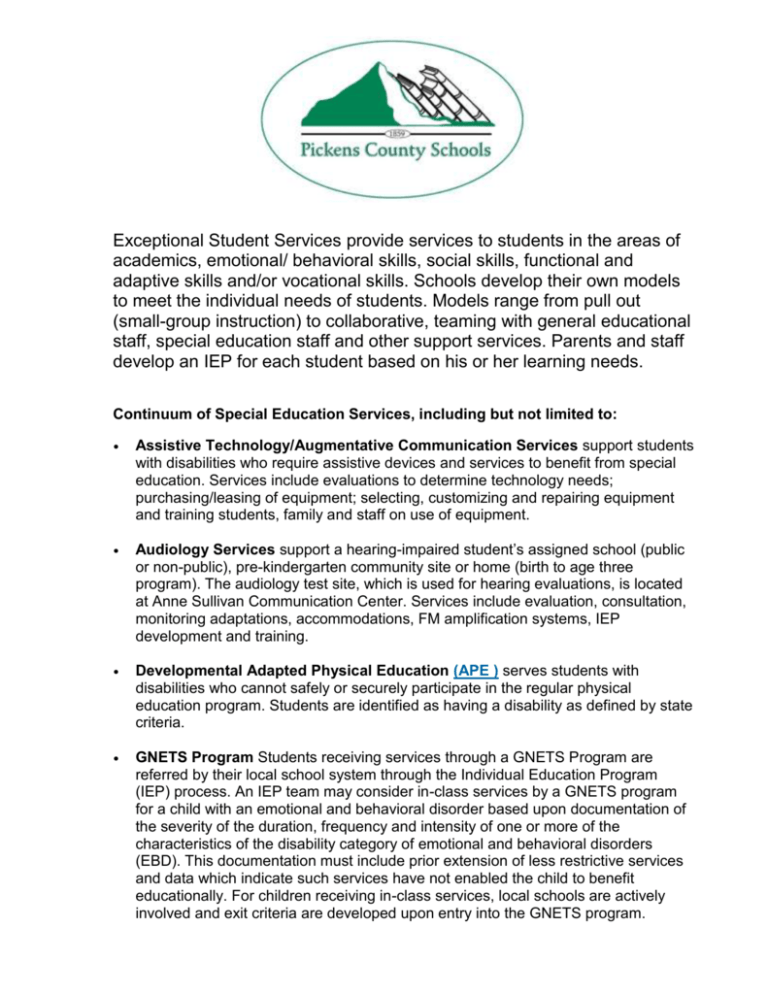
Exceptional Student Services provide services to students in the areas of academics, emotional/ behavioral skills, social skills, functional and adaptive skills and/or vocational skills. Schools develop their own models to meet the individual needs of students. Models range from pull out (small-group instruction) to collaborative, teaming with general educational staff, special education staff and other support services. Parents and staff develop an IEP for each student based on his or her learning needs. Continuum of Special Education Services, including but not limited to: • Assistive Technology/Augmentative Communication Services support students with disabilities who require assistive devices and services to benefit from special education. Services include evaluations to determine technology needs; purchasing/leasing of equipment; selecting, customizing and repairing equipment and training students, family and staff on use of equipment. • Audiology Services support a hearing-impaired student’s assigned school (public or non-public), pre-kindergarten community site or home (birth to age three program). The audiology test site, which is used for hearing evaluations, is located at Anne Sullivan Communication Center. Services include evaluation, consultation, monitoring adaptations, accommodations, FM amplification systems, IEP development and training. • Developmental Adapted Physical Education (APE ) serves students with disabilities who cannot safely or securely participate in the regular physical education program. Students are identified as having a disability as defined by state criteria. • GNETS Program Students receiving services through a GNETS Program are referred by their local school system through the Individual Education Program (IEP) process. An IEP team may consider in-class services by a GNETS program for a child with an emotional and behavioral disorder based upon documentation of the severity of the duration, frequency and intensity of one or more of the characteristics of the disability category of emotional and behavioral disorders (EBD). This documentation must include prior extension of less restrictive services and data which indicate such services have not enabled the child to benefit educationally. For children receiving in-class services, local schools are actively involved and exit criteria are developed upon entry into the GNETS program. • Occupational and Physical Therapy (OT/PT) addresses students’ functional needs, adapted behavior and play and sensory, fine motor and emotional development. Physical therapy addresses gross motor function and works to assess, correct or alleviate acute or prolonged movement dysfunction related to the educational setting. • Services for Students with Vision Disabilities are available for eligible students identified as having a vision disability and who are in need of special education services. • Services for Students with with Deaf or Hard of Hearing Disabilities are available for eligible students identified as having a deaf or Hard of Hearing disability and who are in need of special education services. • School Psychologist Services include helping families and school staff understand students’ behavior, feelings and learning; developing instructional and behavioral intervention strategies; responding to crises; working directly with students to improve their behavioral and social skills and help them manage difficult events in their lives; evaluating students for special education services; and educating parents and staff regarding child development, behavior management and related topics. • Social Work Services include case management services; indirect and direct social work services for students with disabilities; crisis intervention for students and families; consultation with staff regarding the social, emotional and behavioral needs of students; monitoring of procedural safeguards; facilitating parental involvement in educational planning; monitoring students with chronic attendance problems not due to chronic health problems and students at risk of dropping out; implementing and monitoring behavior management plans; mobilizing and coordinating community and school resources; and ensuring the provision of activities within the school system that benefit students with disabilities and promote their full integration into the mainstream environment. • Speech-Language Services support students with communication disabilities including oral language, articulation, voice, stuttering and augmentative communication. Services include direct intervention from an educational speech/language pathologist in the regular or special education classroom, direct intervention outside of the classroom and indirect or consultative service.
